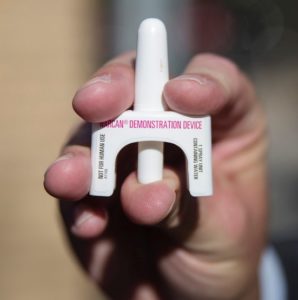From Kaiser Health News.
More States Say Doctors Must Offer Overdose Reversal Drug Along With Opioids
In a growing number of states, patients who get opioids for serious pain may leave their doctors’ offices with a second prescription — for naloxone, a drug that can save their lives if they overdose on the powerful painkillers.
New state laws and regulations in California, Virginia, Arizona, Ohio, Washington, Vermont and Rhode Island require physicians to “co-prescribe” or at least offer naloxone prescriptions when prescribing opioids to patients considered at high risk of overdosing. Patients can be considered at high risk if they need a large opioid dosage, take certain other drugs or have sleep apnea or a history of addiction.
Such co-prescribing mandates are emerging as the latest tactic in a war against an epidemic of prescription and illegal opioids that has claimed hundreds of thousands of lives over the past two decades.
The Food and Drug Administration is considering whether to recommend naloxone co-prescribing nationally (an FDA subcommittee recently voted in favor), and other federal health officials already recommend it for certain patients. And the companies that make the drug are supportive of the moves. It’s not hard to see why: An FDA analysis estimated that more than 48 million additional naloxone doses would be needed if the agency officially recommended co-prescribing nationally.
Most states have limited the volume of opioids doctors can prescribe at one time and dramatically expanded access to naloxone. In California, for example, pharmacists can provide naloxone directly to consumers who are taking illegal or prescription opioids or know someone who is.
In the states with co-prescribing rules, patients aren’t required to fill their naloxone prescriptions, and those with cancer or who are in nursing homes or hospice typically are exempted.
Kristy Shepard of Haymarket, Va., was surprised to find a naloxone prescription waiting for her recently when she went to the pharmacy to pick up her opioid meds. Her first instinct was not to fill it. She did so only after the nurse in her doctor’s office pressured her to. The doctor had never talked to her about Virginia’s new co-prescribing law, she said.
“It’s so silly. I didn’t feel like I needed it. Unless I plan to hurt myself, I’m not likely to overdose,” said Shepard, 41, a registered nurse and hospital administrator who can no longer work and has applied for disability benefits.
